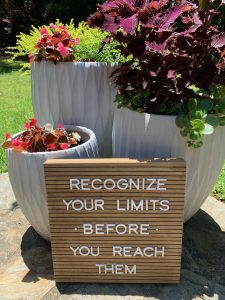
Our family has welcomed 10 new children into our home over the past three years. We’ve had to say goodbye to all 10, most recently a toddler we cared for since she was an infant. I certainly don’t have foster parenting all figured out; I wrestle with complicated feelings especially as I reflect on saying goodbye to this child we so dearly loved. After each of our long-term placements have left our home, our family needed a break. I feel strongly that foster parents who are able to recognize their limits before they reach them are better equipped to keep going. I’ve known children who were displaced because a foster family reached a limit, passed a threshold and couldn’t turn back, and had to close their home. That’s all the motivation I need to have serious, thoughtful reflection about my own limits and those of my husband and biological kids.

Certainly, there are times I don’t see burnout coming, times when my own reaction to a situation surprises me. My goal as a foster parent is to raise my level of self-awareness high enough that those surprises are few and far between. Most days I feel completely inadequate! However, with the unstable, highly erratic lives these children may have lived before they come into my home, the least I can do is try to offer stability and consistency while they are here. These kids are well worth the effort.
The day-to-day care of children often feels relentless and exhausting. Mental and physical breaks are seldomly offered. Time for self-care is minimal and rarely makes its way up the priority list. Many foster parents have a higher capacity than I do for chaos. My husband and I are as Type A as they come, and we thrive in order and routine — those types of controls are practically nonexistent — laughable even — in the context of foster care. I envy parents who thrive in this chaos, but too much of it for too long causes me to lose all patience and composure. So I snatch up the opportunity for a break after long-term placements leave my home. I need periods of time when I can stop, take a deep breath and reset some controls in my life. As I said, I don’t have this foster parenting thing all figured out, but as I reflect on where we are along our own fostering journey right now, I wanted to share some of what I’ve learned. This is what works for me, but may not necessarily work for everyone.
Here’s why breaks are critical for me as a foster parent:
- My heart needs a rest (and, honestly, my body does too). I will better serve the next children we foster if I am mentally and physically prepared. After tough goodbyes, our hearts and minds need to work through the stages of grief. In certain situations, that grief doesn’t last long. At other times, it hangs on. Some foster parents face their grief head-on by saying yes to the very next call from placement. Others, like me, need more downtime to work through the emotions. Whichever you are, that’s okay. And bio kids might be ready sooner than the parents. The key is recognize what each member of your family needs, and honor it.
- Our family needs to level set. Our biological daughters (twins soon to be teenagers, yikes!) have reacted differently to different children we have cared for in our home. As adults, we have reacted differently as well. Fostering means constantly learning new things … about how society treats these families, about our local community, about ways our extended family and friends react to children in our care, and even about our own reactions. Our biological children need time to work through the complicated emotions they feel when each placement leaves. Taking a break allows us to make sure our children’s needs for time and attention are being met, and that their emotions are acknowledged and dealt with in healthy, productive ways. Taking the time those steps require is the best way to purposely ensure we are all ready to say yes to the next placement.
- Offering respite, emergency and short-term care meets a strong need, and also teaches us a lot. Saying yes to an emergency placement gives a child the safe haven he or she needs for the night (is anything more important that that?), allowing us to continue our service to children even during a ‘break.’ Breaks between long-term placements also allow me more bandwidth to offer support to other foster parents, something I feel passionate about that truly fills my emotional bucket. Taking a break between long-term placements also gives our family time to re-evaluate our preferences for age and the number of children we have the capacity to best care for.
Each family has its own strengths and its own limitations. I have so much awe and respect for foster families who fill every bed, say yes every time placement calls, and keep breaks short. I have to be honest with myself and recognize that simply isn’t me. I would like to continue fostering for years into the future and meet each new placement with my best self. The only way I can accomplish those goals is by recognizing my triggers and threshold for burnout, and stop short of reaching that point.

Saying “no” now will allow me to say a full-hearted “yes” later on. And I know that my “no” can open the door for another family’s best “yes.” It’s not about me saying yes or no; it’s about the kids having the best fit when placed in a new home. And when I’m burned out or recovering from parenting in the trenches for too long, I can’t give my best yes. Our home wouldn’t be the best fit for that child, any child, including my biological children.
Children in care deserve the best we can give them! I encourage you to recognize your own strengths and limitations in order to ensure your best self greets the next child standing in your doorway.
No makes room for yes, and who doesn’t want more room for that?
― Kelly Corrigan, Tell Me More: Stories about the 12 Hardest Things I’m Learning to Say



